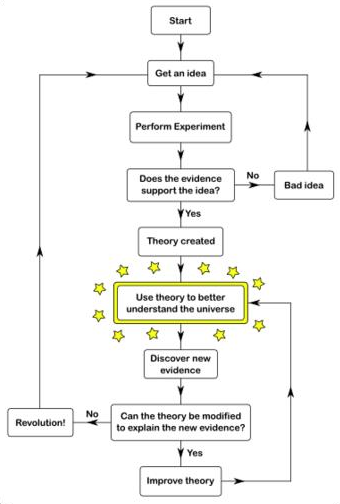The Scientific Method
1. State the Problem or Ask a question (Usually when you find something interesting or puzzling)
2. Get Background Information (Ask an expert, do library research)
3. Make Observations (Survey, Measure, Count, Weigh, Look, Listen, Touch, Taste, Smell)
4. Formulate a Hypothesis (Suggest an answer to your question based on what is known - this is an "educated guess")
5. Design an Experiment (You must test your hypothesis under controlled conditions)
6. Collect and Analyze Data (Interpreting the results of your experiment, often using statistics)
7. Evaluate Hypothesis (Draw some conclusions. Solve the problem, answer the question)
- Accept Hypothesis-You're done. You've answered the question.
- Reject Hypothesis-Start over. Formulate a new hypothesis based on what you've learned.
Occam's Razor: If there are several possible explanations, accept the simplest one (the one that makes the fewest assumptions).
Q1: What is the underlying assumption on which science is founded?
A1: There is an unchanging set of physical laws that governs the universe.
Q2: What result should we expect if the critical experimental procedures are repeated at different times or locations, or by different researchers?
A2: If experiments could be duplicated exactly, you should always get exactly the same results. In other words, experiments must be repeatable. Important discoveries in science are confirmed by labs working independently.
Q3: If it were possible to completely understand the laws of the universe, would it be possible to accurately predict the future?
A3: If you understand the physical laws that govern a process, you should be able to make accurate predictions. The better you understand the laws, the more accurate the predictions should be. For example, the laws of planetary motion are fairly well understood, and scientists can pinpoint the location of planets hundreds of years into the future.
Q4: Can science provide the answer to any question?
A4: No. A hypothesis must be testable. If someone asked a scientist to prove* that Santa Claus doesn't exist, it couldn't be done. The best a scientist could do would be to show that it is unlikely and suggest a more plausible explanation (one that involves fewer assumptions). The argument might go something like this...
*Scientists tend to shy away from statements of absolute proof. Instead they speak of probabilities or most likely explanations. This can be a problem when scientists are asked to testify in legal matters, where "absolute proof" is demanded.
